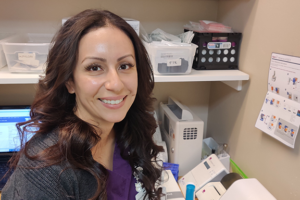Do you like a challenge and want a meaningful career?
Medical assisting fulfills these needs and more. Medical assistants perform a variety of tasks from greeting patients and taking vitals to administering vaccines and removing stitches. CMA’s students learn blood urine analysis, proper specimen collection and assisting in minor office surgeries as well as to clean and wrap instruments for sterilization, set up a sterile field, and how to remove surgical sutures and staples. There is never a dull moment for a CMA.
What type of job can this training lead to?
Assistant
 *Angelica Flippo (Medical Assistant Family Practice)When I started working as a Medical Assistant at Bonneville Family Practice, I was so thankful for all of the hands-on labs that I practiced at Tooele Tech. I take vitals, collect lab samples, and administer immunization confidently. Working in a fast-paced family practice office makes every day exciting. I assist the doctor with everything from pediatrics to geriatrics and love the variety! -Angelica F.
*Angelica Flippo (Medical Assistant Family Practice)When I started working as a Medical Assistant at Bonneville Family Practice, I was so thankful for all of the hands-on labs that I practiced at Tooele Tech. I take vitals, collect lab samples, and administer immunization confidently. Working in a fast-paced family practice office makes every day exciting. I assist the doctor with everything from pediatrics to geriatrics and love the variety! -Angelica F.
Salary: $27,560 – $33,550
(archived) Clinical Medical Assistant
Students learn how to be healthcare professionals responsible for various clinical and administrative duties. They examine the importance of effective communication as well as HIPAA privacy regulations. They learn to perform administrative tasks such as scheduling appointments, maintaining patient records, billing, and insurance processing. They study anatomy and physiology, and learn each of the human body systems in depth. Students learn medical terminology, electronic health records, and phlebotomy. Students will demonstrate proper clinical responsibilities like obtaining patient vital signs, injections, EKG’s, ear and eye wash techniques, and visual acuity testing. Students acquire skills to perform blood and urine analysis, proper specimen collection, and assisting in minor office surgeries. They also learn how to clean and wrap instruments for sterilization, set up a sterile field, and how to remove surgical sutures and staples. They will earn their BLS CPR certification while in the program.
Competencies include knowledge of major body systems, how they work and medical terminology including spelling and pronunciation as well ask other healthcare skills such as:
- Working knowledge in the basics of Diagnostic and Procedural Coding
- Competent in recognizing and overcoming communication barriers, and strategies to create a team environment in the healthcare facility
- Demonstrates respect for individual diversity, including gender, race, religion, age, economic status, and appearance
- Proficient in high-quality customer service and how to identify with patients
- Successfully understand and communicate with patients and display sensitivity to diverse populations
- Proficient in documenting in patient charting system
- Proficient in identifying medical terms and abbreviations related to body systems
- Proficient in following safety precautions and calculating proper dose of medications using basic mathematical computations
- Proficient in taking and recording vital signs, administering injections and assisting with clinical examinations and procedures.
- Working knowledge of signs, symptoms, and disease conditions affecting the major systems of the body
- Accurately identify laboratory tests, clinical procedures, and abbreviations relevant to the major systems of the body
 College Credits
College CreditsAverage Program Length: Approximately 910 hours
*Estimate based on course cost, books and fees. All costs are subject to change.
Tooele Technical College Campus
88 S. Tooele Blvd., Tooele
8 a.m. - 8 p.m. Monday - Thursday
8 a.m. - 2 p.m. Fridays
Langi
Downloads
Health Care Program Requirements 7-17-19Links
Clinical Medical Assistant Program Information Sheet Course Planning Sheet and Price List(archived) Clinical Medical Assistant
- ALL adult students must provide their high school transcripts, showing at least an 8th grade math and 11th grade reading level with a ‘C’ grade or higher or take the Test of Adult Basic Education (TABE) scoring at a 8th grade level for math and and 11th grade level for reading.
- Students must submit a current immunization record showing: MMR, Tdap, Hep. B series, Varicella, and must have a current TB screening completed within the last year, current flu immunization.
- For adult Students: The background check and drug screen are required
For high school students: The drug screen is required
- Must be 18 years old
- Employers may have additional requirements






